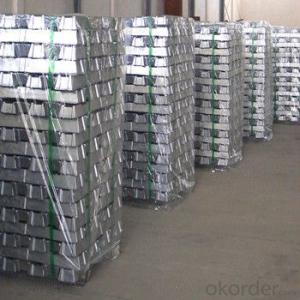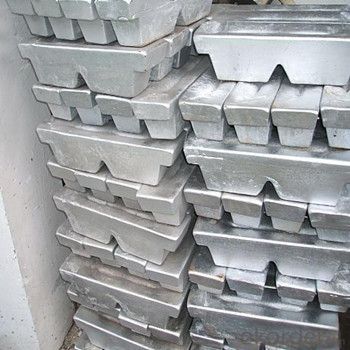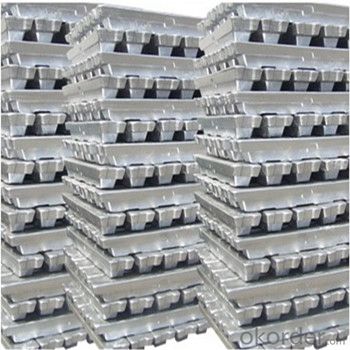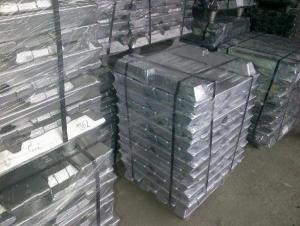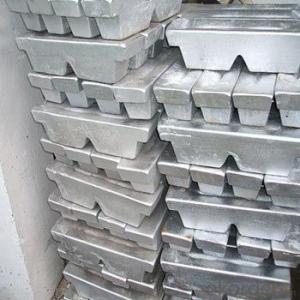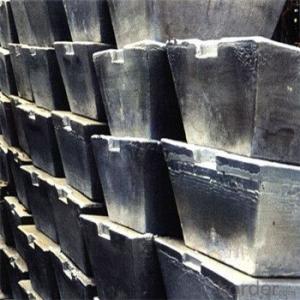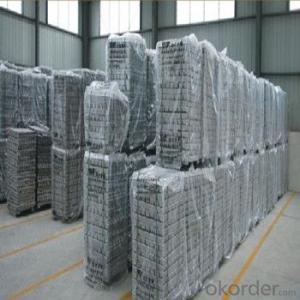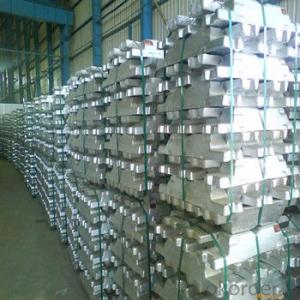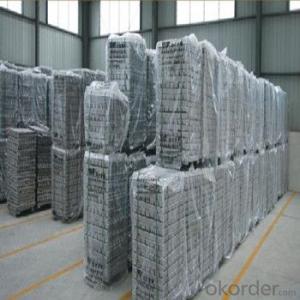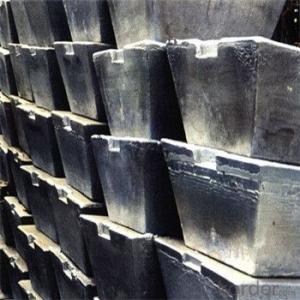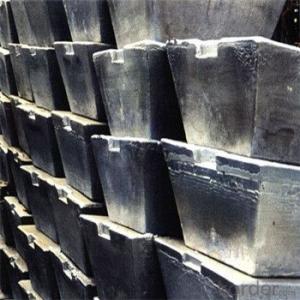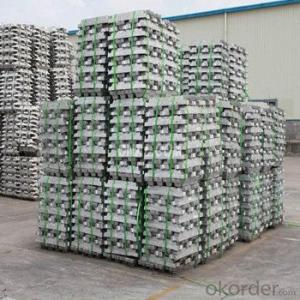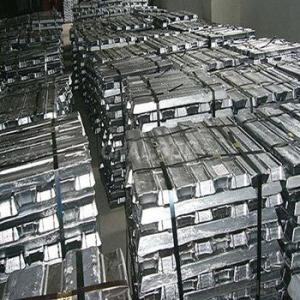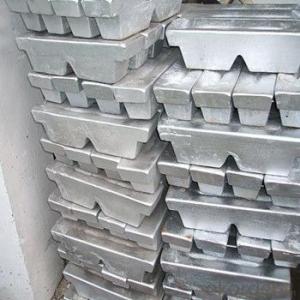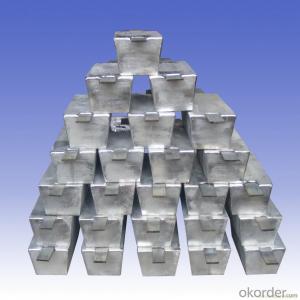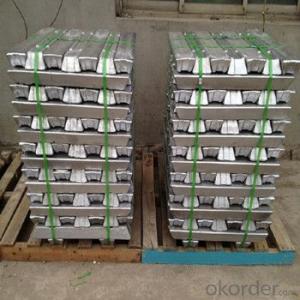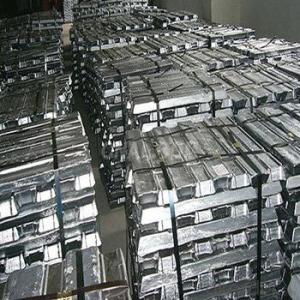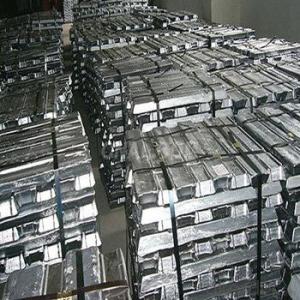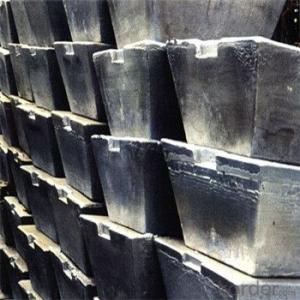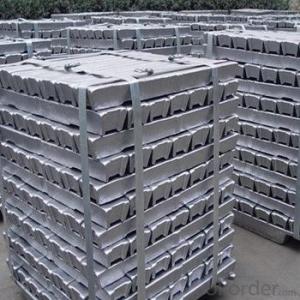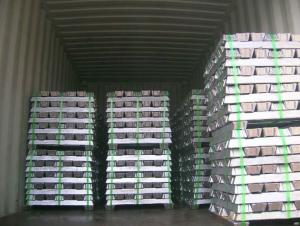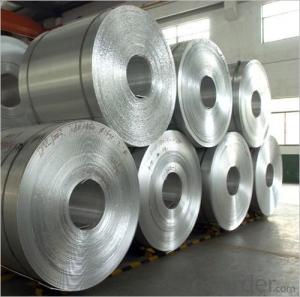Aluminum Ingot 99.7 From Factory Wholesale Pure
- Loading Port:
- China main port
- Payment Terms:
- TT OR LC
- Min Order Qty:
- 1000 m.t.
- Supply Capability:
- 10000 m.t./month
OKorder Service Pledge
OKorder Financial Service
You Might Also Like
Pure Aluminum Ingot Used for Industry
1.Structure of Aluminum Ingot Description
A material that has been cast into a shape in order to be transported and processed easier than in an unprocessed form. An ingot is typically rectangular in shape, which allows it to be stacked. Ingots are most commonly associated with metals, with ingots of gold held in the vaults of banks and brokerages being popular images.
2.Main Features of the Aluminum Ingot
•High Purity
•High strength
•Fast melting
•Best price
•Good after-service
3. Aluminum Ingot Images
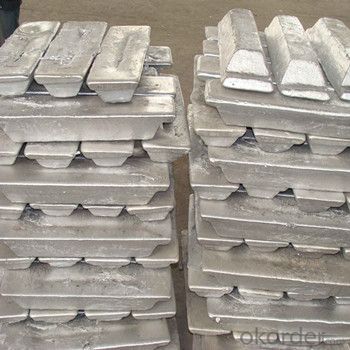
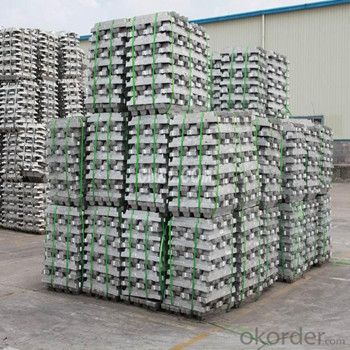
4. Aluminum Ingot Specification
Grade | Chemical Composition % | |||||||||
Al≥ | impurities ≤ | |||||||||
Si | Fe | Cu | Ga | Mg | Zn | Mn | others | Sum | ||
Al99.9 | 99.90 | 0.50 | 0.07 | 0.005 | 0.02 | 0.01 | 0.025 | - | 0.010 | 0.10 |
Al99.85 | 99.85 | 0.80 | 0.12 | 0.005 | 0.03 | 0.02 | 0.030 | - | 0.015 | 0.15 |
Al99.7 | 99.70 | 0.10 | 0.20 | 0.010 | 0.03 | 0.02 | 0.030 | - | 0.030 | 0.30 |
Al99.6 | 99.60 | 0.16 | 0.25 | 0.010 | 0.03 | 0.03 | 0.030 | - | 0.030 | 0.40 |
Al99.5 | 99.50 | 0.22 | 0.30 | 0.020 | 0.03 | 0.05 | 0.050 | - | 0.030 | 0.50 |
Al99.00 | 99.00 | 0.42 | 0.50 | 0.020 | 0.03 | 0.05 | 0.050 | - | 0.050 | 1.00 |
5.FAQ of Aluminum Ingot
We have organized several common questions for our clients,may help you sincerely:
①How about your company?
A world class manufacturer & supplier of castings forging in carbon steel and alloy steel,is one of the large-scale professional investment casting production bases in China,consisting of both casting foundry forging and machining factory. Annually more than 8000 tons Precision casting and forging parts are exported to markets in Europe,America and Japan. OEM casting and forging service available according to customer’s requirements.
②How to guarantee the quality of the products?
We have established the international advanced quality management system,every link from raw material to final product we have strict quality test;We resolutely put an end to unqualified products flowing into the market. At the same time, we will provide necessary follow-up service assurance.
③How long can we receive the product after purchase?
In the purchase of product within three working days, We will arrange the factory delivery as soon as possible. The pecific time of receiving is related to the state and position of customers.Commonly 7 to 10 working days can be served.
- Q: Yl302 aluminum ingot is alumina alloy?
- Used in the manufacture of castings, die cast aluminium is the type of aluminum alloy used in the production of castings by die casting.
- Q: How are aluminum ingots used in the production of architectural structures?
- Aluminum ingots are widely used in the production of architectural structures due to their numerous advantageous properties. These ingots serve as the raw material for the manufacturing of various aluminum products such as beams, columns, façades, and roofing systems. One of the primary reasons for using aluminum ingots in architectural structures is their lightweight nature. Aluminum is significantly lighter than other conventional construction materials like steel or concrete. This characteristic makes it easier to transport, handle, and install the finished architectural components, reducing overall construction time and costs. Furthermore, aluminum ingots possess excellent corrosion resistance. When exposed to the elements, aluminum forms a natural oxide layer that protects it from rust and decay. This property ensures that the architectural structures made from aluminum ingots remain strong and visually appealing for an extended period, even in harsh environments. The versatility of aluminum ingots also plays a crucial role in architectural applications. Aluminum can be easily extruded, cast, or molded into various shapes and profiles, allowing architects and designers to create unique and intricate structures. This flexibility enables the production of custom-made components that meet specific design requirements, enhancing the aesthetic appeal of the structures. Additionally, aluminum ingots offer excellent thermal and electrical conductivity. This feature is particularly beneficial in architectural structures as it allows for efficient energy transfer and distribution. Aluminum components can be integrated into heating, ventilation, and air conditioning systems, ensuring optimal energy efficiency and cost savings. Moreover, aluminum ingots are highly sustainable and environmentally friendly. Aluminum is 100% recyclable without losing its original properties, making it a preferred choice for eco-conscious architects and builders. By incorporating aluminum ingots into architectural structures, the construction industry can significantly reduce its carbon footprint and contribute to a more sustainable future. In conclusion, aluminum ingots are widely used in the production of architectural structures due to their lightweight nature, corrosion resistance, versatility, thermal and electrical conductivity, and sustainability. These properties make aluminum ingots an ideal material for creating durable, visually appealing, and energy-efficient structures that meet the demanding requirements of modern architecture.
- Q: What are the benefits of using aluminum ingots in the construction of lightweight structures?
- There are several benefits of using aluminum ingots in the construction of lightweight structures. Firstly, aluminum is a lightweight metal, making it an ideal choice for constructing lightweight structures. It has a density that is approximately one-third of steel, allowing for the creation of structures that are significantly lighter in weight. This is particularly advantageous in industries such as aerospace, automotive, and marine, where reducing weight is crucial for improving fuel efficiency and overall performance. Secondly, aluminum is highly corrosion-resistant. Unlike other metals, such as steel, aluminum does not rust when exposed to moisture or other corrosive elements. This makes it an excellent choice for structures that are exposed to harsh environmental conditions, such as buildings near the coast or in areas with high humidity. By using aluminum ingots, the structures can withstand corrosion, ensuring their longevity and reducing maintenance costs. Furthermore, aluminum is a highly malleable material, allowing for greater design flexibility. It can be easily shaped and formed into various complex geometries, enabling architects and engineers to create innovative and aesthetically pleasing structures. This versatility in design also allows for efficient use of materials, reducing waste and maximizing the structural integrity of the lightweight construction. Another significant benefit of using aluminum ingots is their excellent strength-to-weight ratio. Despite being lightweight, aluminum structures can still possess impressive strength and durability. This makes them suitable for applications where both strength and weight reduction are essential, such as in the construction of aircraft, high-rise buildings, and bridges. Additionally, aluminum is a sustainable material as it is highly recyclable. It can be melted down and reprocessed repeatedly without losing its properties, making it an environmentally friendly choice. By using aluminum ingots, construction projects can contribute to the circular economy and reduce the demand for new raw materials. In conclusion, the use of aluminum ingots in the construction of lightweight structures offers numerous benefits. These include reduced weight, corrosion resistance, design flexibility, excellent strength-to-weight ratio, and sustainability. Incorporating aluminum into construction projects can lead to improved performance, increased efficiency, and reduced environmental impact.
- Q: How is aluminium ingot made?
- Aluminium is a silvery white metal, second only to oxygen and silicon in the earth's crust, and ranks third. The density of aluminum is small, only 34.61% of iron and 30.33% of copper, so it is also called light metal. Aluminum is the world's output and consumption of ferrous metals only next to steel. The density of aluminum is only about 2.7103g/cm3, about 1/3 of the density of steel, copper or brass.
- Q: What are the different cutting techniques for aluminum ingots?
- There are several cutting techniques that can be used for aluminum ingots, depending on the desired outcome and the specific application. 1. Bandsaw cutting: This method involves using a bandsaw machine with a specialized blade to cut through the aluminum ingot. Bandsaw cutting is commonly used for large-scale production as it allows for high precision and accuracy in cutting. 2. Circular saw cutting: Circular saws equipped with carbide-tipped blades can also be used to cut aluminum ingots. This method is suitable for both small-scale and large-scale cutting operations, offering a relatively fast cutting speed. 3. Waterjet cutting: Waterjet cutting uses a high-pressure stream of water mixed with an abrasive material to cut through the aluminum ingot. This technique is ideal for precise and intricate cuts as it does not generate heat, minimizing the risk of thermal distortion. 4. Plasma cutting: Plasma cutting involves using a plasma torch to melt and cut through the aluminum ingot. It is a versatile cutting method that can be used for various thicknesses and shapes. 5. Laser cutting: Laser cutting utilizes a highly focused laser beam to melt and vaporize the aluminum, creating a clean and precise cut. This technique is particularly effective for thin aluminum ingots. 6. Shearing: Shearing is a cutting technique that involves applying a shearing force to the aluminum ingot, typically using a guillotine-style machine. This method is suitable for cutting thicker ingots and can be used for both straight and curved cuts. Each cutting technique has its advantages and limitations, and the choice of method depends on factors such as the desired cut quality, speed, complexity of the shape, and available equipment. It is recommended to consult with experts or professionals in the field to determine the most suitable cutting technique for a specific application.
- Q: What kind of material is die casting aluminium ingot?
- Material / model1, according to the content of aluminum ingot content is divided into1) advanced pure aluminum: aluminum content of 99.93%-99.999%2) industrial high-purity aluminum: aluminum content of 99.85%-99.90%3) industrial pure aluminium: the content of aluminium is 98.0%-99.7%2, remelting with aluminum ingot according to the chemical composition is divided into 6 grades: (Note: Al after the number is aluminum content)
- Q: What are the common uses of aluminum ingots?
- Due to their unique properties, aluminum ingots find a wide range of common uses. One industry that heavily relies on aluminum ingots is the automotive industry, where they are utilized in the manufacturing of various products. Engine components like cylinder heads and engine blocks, as well as body panels and wheels, are made from aluminum ingots. This is because the lightweight nature of aluminum helps improve fuel efficiency and reduce vehicle weight. The construction industry also benefits from the use of aluminum ingots. It is used to fabricate window frames, door frames, roofing materials, and structural elements. Aluminum's high resistance to corrosion makes it suitable for outdoor applications, and its lightweight nature allows for easy installation and transportation. In the packaging industry, aluminum ingots play a vital role. They are used to make cans for beverages and food items because of their excellent barrier properties, which protect the contents from light, moisture, and air. Additionally, aluminum cans are easily recyclable, making them a sustainable choice. The electrical industry also heavily relies on aluminum ingots. They are utilized in the production of power transmission lines, electrical wiring, and conductors. Aluminum's high electrical conductivity and low weight make it an ideal material for conducting electricity efficiently and cost-effectively. Lastly, the aerospace industry benefits from the use of aluminum ingots. The lightweight yet strong characteristics of aluminum make it an excellent choice for manufacturing aircraft components such as wings, fuselages, and structural parts. The weight reduction achieved with aluminum significantly improves fuel efficiency and overall performance. In conclusion, aluminum ingots have diverse applications in various industries, including automotive, construction, packaging, electrical, and aerospace. Its versatility, strength, and lightweight nature make it an essential material in modern manufacturing processes.
- Q: What are the advantages of using aluminum ingots in the production of automotive lightweighting solutions?
- There are several advantages of using aluminum ingots in the production of automotive lightweighting solutions. Firstly, aluminum is a lightweight material, which helps in reducing the overall weight of the vehicle. This leads to improved fuel efficiency and reduced emissions. Additionally, aluminum has excellent strength and durability properties, making it suitable for automotive applications. It can withstand harsh operating conditions and provide a high level of safety. Moreover, aluminum is highly corrosion-resistant, prolonging the lifespan of the vehicle. Lastly, aluminum is a recyclable material, making it environmentally friendly and contributing to sustainable manufacturing processes. Overall, the use of aluminum ingots in automotive lightweighting solutions offers various benefits in terms of performance, efficiency, safety, and sustainability.
- Q: What are the impurities found in aluminum ingots?
- The impurities commonly found in aluminum ingots include silicon, iron, copper, zinc, manganese, and magnesium.
- Q: How are aluminum ingots used in the production of heat exchangers?
- Due to their excellent thermal conductivity, lightweight properties, and corrosion resistance, aluminum ingots find extensive use in the manufacturing of heat exchangers. These devices are responsible for transferring heat between multiple fluids, and aluminum ingots play a vital role in enhancing their efficiency and durability. Firstly, the thermal conductivity of aluminum surpasses that of many other metals, making it an ideal material for heat exchangers. Its high thermal conductivity enables efficient heat transfer between fluids, resulting in rapid and effective temperature exchange. This quality proves especially advantageous in applications that require swift heat transfer, such as automotive radiators or air conditioning systems. Additionally, aluminum ingots offer a lightweight alternative to metals like copper or steel. This characteristic is particularly beneficial in industries where weight reduction is crucial, like aviation and automotive. The lightweight nature of aluminum ingots not only helps reduce the overall weight of the system but also facilitates easy handling and installation of heat exchangers. Moreover, aluminum ingots possess exceptional corrosion resistance, especially when exposed to harsh environments or corrosive fluids. This resistance is attributed to the formation of a thin protective oxide layer on the surface of the aluminum, preventing further oxidation and degradation. Heat exchangers often come in contact with various fluids, some of which may be corrosive. By utilizing aluminum ingots, the risk of corrosion-related failures is minimized, ensuring the long-lasting and reliable performance of the heat exchanger. Furthermore, aluminum ingots offer versatility in terms of fabrication and customization. They can be easily cast, extruded, or formed into complex shapes, allowing for the production of heat exchangers with intricate designs and optimized performance. This flexibility in manufacturing processes enables the production of heat exchangers tailored to specific requirements, further enhancing their overall efficiency and effectiveness. In conclusion, aluminum ingots are crucial components in the manufacturing of heat exchangers due to their superior thermal conductivity, lightweight properties, corrosion resistance, and versatility in fabrication. Their utilization significantly improves heat transfer efficiency, reduces weight, ensures durability, and allows for customization, making them the preferred choice in various industries.
Send your message to us
Aluminum Ingot 99.7 From Factory Wholesale Pure
- Loading Port:
- China main port
- Payment Terms:
- TT OR LC
- Min Order Qty:
- 1000 m.t.
- Supply Capability:
- 10000 m.t./month
OKorder Service Pledge
OKorder Financial Service
Similar products
Hot products
Hot Searches
Related keywords
